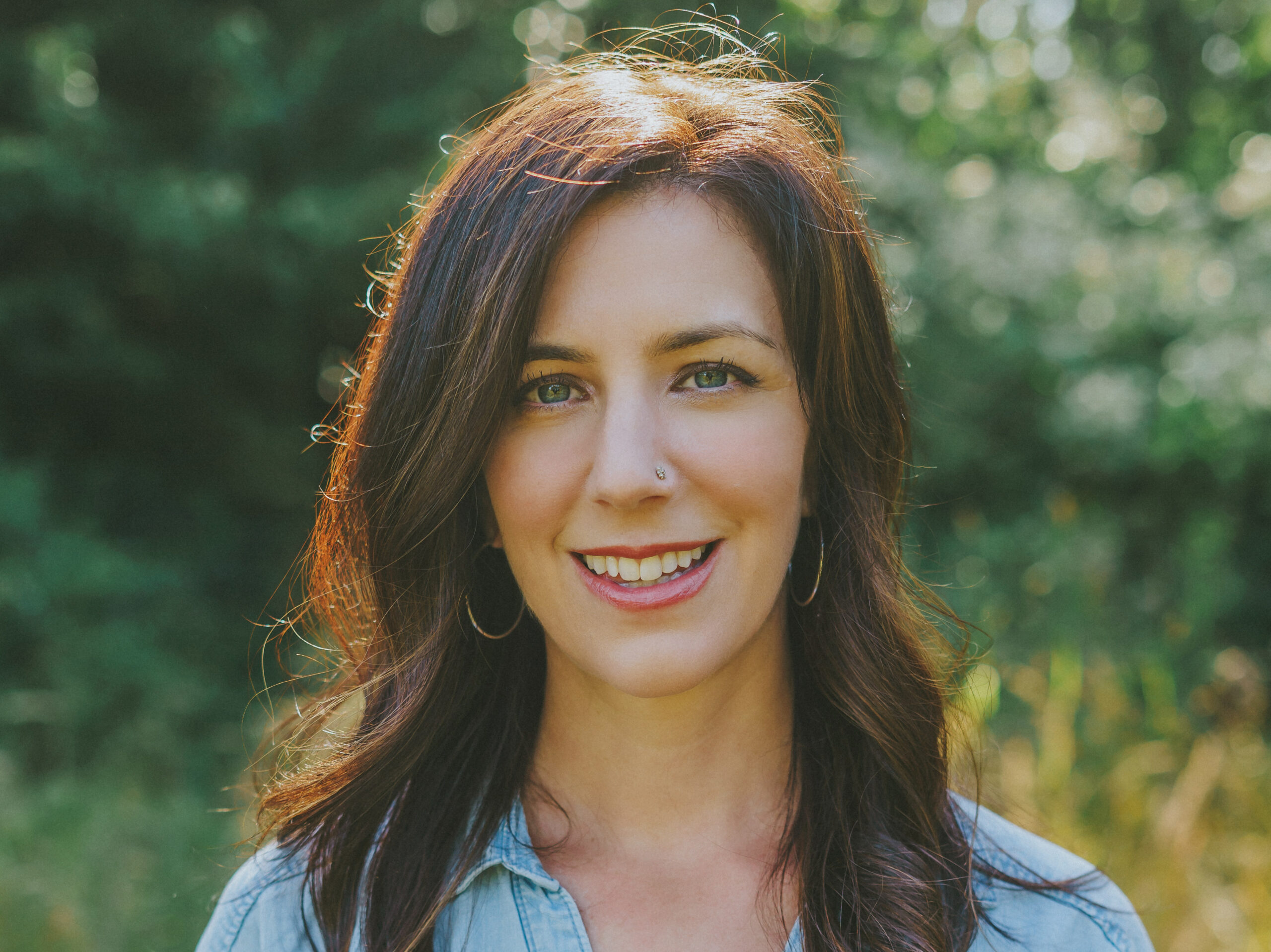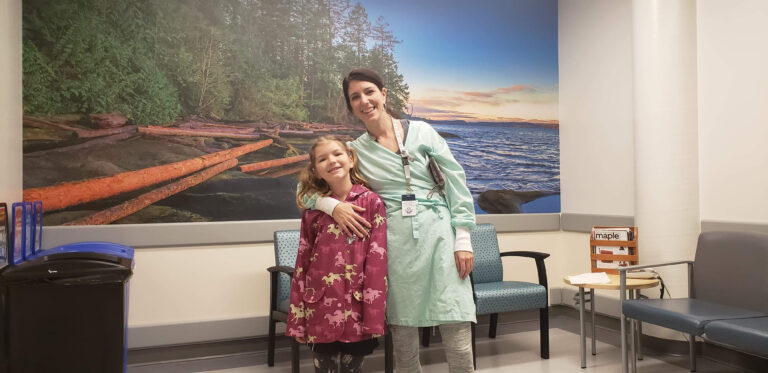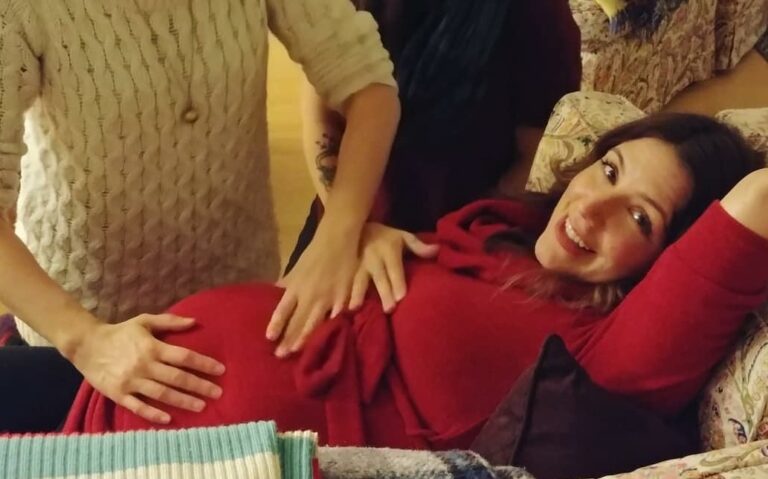Sarah-Jane Steele, or SJ to her friends, has midwifery in her blood.
Ten years after completing her degree in journalism, she chose UBC’s tight-knit and supportive midwifery program as the ideal place to gain the knowledge and practical skills for her new career – one that saw her following in her footsteps of her great-great-grandma. Alongside the clinical and scientific acumen necessary to ensure healthy births, SJ particularly enjoyed the program’s professional placements and variety of courses, including those that let her look holistically at the birthing process and realize the responsibility of helping and protecting people during childbirth. Now a registered midwife and working in the field she loves, SJ has started a rewarding career that helps her to balance her time in the clinic with her own family.
Where are you from, and what was your path to UBC?
I originally hail from Dartmouth, Nova Scotia: the traditional, unceded lands of the Wabanaki and Mi’kma’ki people. My great-great-grandmother was an Irish settler midwife in the bays of Halifax and I guess it was in my DNA to pursue the career, but we had no medical training for midwives in Nova Scotia, and we still don’t. I had my first child in BC and heard excellent things about UBC’s Midwifery program and I began studying my prerequisites to one day gain admission. I wasn’t really in a place to apply until 2015 as I was a single parent at the time and working four jobs, but when I did, I was successful, and a new path began.
Why did you choose your program?
I heard doctors, firefighters, and lots of others say this, but it wasn’t until I witnessed my first birth that I really knew that it was always what I was supposed to do. Midwifery requires a certain type of person. I never really felt my true direction until I read the Midwifery page on the UBC site, and everything just clicked in that moment.
What big questions did you have before arriving at UBC (about yourself or about the world)?
As a mature student, when I re-entered post-secondary education (my first degree in Journalism was completed almost 10 years earlier) I wondered if I’d be able to keep up with online learning, reviewing, and studying content. I also questioned if I would be able to find friends when it seemed like everyone attending UBC was under the age of 30, unencumbered, and “fresh”.
How wrong I was! I found other folks who were parents and who had their own stories of hard knocks. I loved my time in UBC student family housing. I even found a babysitter who lived a few floors up from me who was here from Jordan, and we learned so much about her culture. I could really lean on her in a pinch as studying and classes didn’t always fall within the hours of my daughter’s daycare. Neither does midwifery!
What did you like most about your degree?
I enjoyed my clinical coursework and inter-professional placements with those in obstetrics, general practitioners, and pelvic floor physios. Our scope can expand immensely when we work collaboratively with other care providers in contraception, family planning, physical therapy, and obstetrics, all for the greater good of our patients and clients.
What was your favourite course during your degree, and why?
I loved a course we did in first year called “birth and its meaning”. There is no question that our job requires clinical acumen, but the roots of midwifery stem from an appreciation and respect for cultural practices and ceremony surrounding birth, keeping birth (and midwives) in the community, and understanding how those elements promote healthy birth. This class allowed us to explore these ideas and we also created our own projects illuminating what we appreciate about the circle of life and our role within it.
I once heard Penny Simkin, a renowned doula and childbirth educator, speak at a childbirth and trauma training. She said people remember their experience of childbirth vividly even years later, with very few memory lapses. They recall other things, even their wedding day, with less specificity and detail. Before we learn all the clinical things – the tests we need to order, the things we need to prescribe, how to manage births – we need to remember that we are here to improve that experience for people. That class really made me realize the weight of that responsibility and my role in honouring and keeping birth safe.
What is your current job, and what do you like most about it?
I’m a registered midwife with Arbutus Midwives in Victoria, BC. What I love most about the job is the variety – it puts all of my adaptability skills to the test. I also love how the midwives in my community have joined together as best they can, despite “COVID burnout”, to try and help each other. I admire their true generosity of spirit and seek to live up to it.
What does a day-in-the-life look like for you?
I’m either in clinic, first call, or second call. First call means seeing to all labs, emails, and calling clients with results while also managing any births in progress. Second call is being available as a second midwife for any home births or helping out if the first call is too busy. A clinic day is a 9-t0-5 whirlwind. One clinic visit might be doing a pap smear, the next I’ll be weighing a baby and calculating its gain or loss, the next I’ll be a shoulder to cry on. Luckily at my practice you don’t usually have to go on call after managing a busy antenatal clinic, so I can usually pick up my children and have dinner with them reliably on clinic days. One thing is for sure – almost every day is busy!
How did UBC help prepare you for your career?
We are re-certified annually in everything from midwifery emergency skills, neonatal resuscitation, and other obstetrics certifications. The scenario testing run by our UBC profs every year made us accountable for knowing those skills inside out and backwards, and this really does prepare you for the work in the way that only repetition can. I don’t think anything can truly get you ready for the real thing, but I have vital teachings from each of the professors that helped prepare me for the career, which I take with me every time I walk into a birth.
How did you discover and apply for your first job after leaving UBC?
In my clerkship, I sent emails around all of the practices in my community, asking if they wanted or needed a new registrant midwife. In our community, only a couple of new midwife spots are available and they are highly coveted. In the end I was lucky to have been contacted by a practice looking for a locum and my application was a success! We do have a listserv that posts jobs for all over BC, and the Canadian Association of Midwives post jobs available all across Canada and overseas, so this is also a great place to job seek.
What do you miss most about UBC now that you’ve graduated?
I miss my classmates and seeing my teachers in person. COVID bubbled us into online learning so many of us hadn’t seen each other since the start of the pandemic. We all graduated online and it was so hard not to walk across the stage with everyone and share our achievements together in one room. I also miss taking my daughter to the UBC Farmers Market on Saturday mornings or walking along the beaches near campus.
In your opinion, what makes UBC and its Midwifery degree distinctive from other universities?
UBC Midwifery is distinct in offering only a select number of seats. I think there is something to be said for our small group of just 20 midwives, versus being a larger group as you find at other universities. We knew each other’s children’s names, and we attended each other’s births. I also felt that I was known by name by my profs, and I really needed them at times when life got in the way of being a student and clerk; they rose to the occasion to support me. I also received bursaries that really saved my bacon, and student family housing was amazing, as were the daycares on campus (my daughter still raves about her time at Salal daycare). I don’t know that I could have been brave enough to go after this career without the supports UBC provided on campus.
Now that I am on the other side of my degree, I feel that this program is achievable with the right financial and cultural supports in place. I am hopeful UBC will create more funding and positions for BIPOC and Indigenous students going forward, to increase the representation of BIPOC and Indigenous Midwives in birthwork, as that is what will continue to make UBC distinct from other universities.


